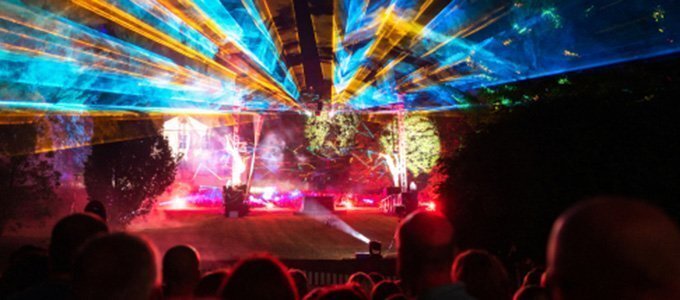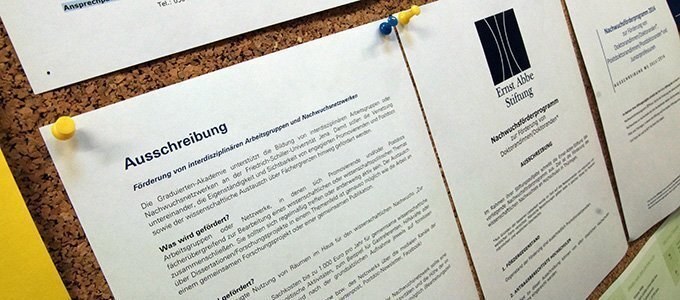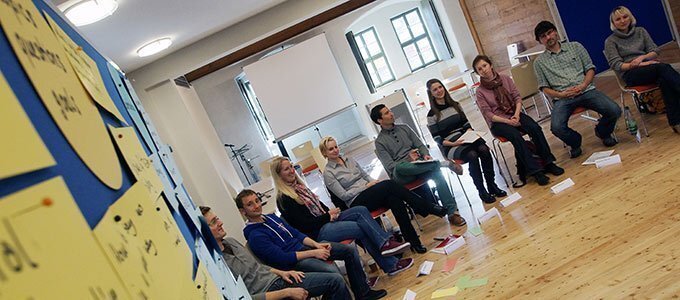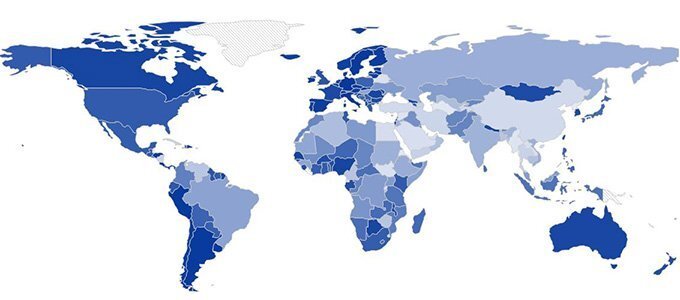|
 |
Events
- On 8 June 2022, the German Association for Junior
Professorships will hold its 8th
symposium in Jena on the topic of "Tenure
Track today and tomorrow". There, on the one
hand, the evaluation procedure for tenure track
professorships will be examined and, on the other
hand, the future of academic careers in Germany will
be discussed. All interested parties, especially
postdocs, junior and tenure-track professors and
university administration staff, can register
for the conference.
- The university wants to be more sustainable. In a
university-wide Future Workshop on 31 May,
initial ideas will be collected and discussed on how
the University of Jena can become more
sustainable in the various areas. A sustainability
strategy will then be developed on this basis.
There is also still time to take part in a mobility
survey by the Green Office until 17 April.
- On 31 May, there is also the Germany-wide Diversity
Day. Around this day, the university offers
several workshops on topics such as empowerment,
migration or working in a mentally healthy way.
Shortly, you will find more information here.
- After a two-year hiatus, the summer festival
of Jena University can finally take place
again on the evening of Schiller Day this year
(Photo: C. Worsch). This year's Schiller Day is on
24 June. Ticket
sales for the event are expected to start at
the beginning of May.
|
|
|
|
 |
Get
involved
- The "Network
for Decent Labour in Academia" (NGAWiss)
is five years old now. In this network, academics in
mid-level positions are committed to improve the
often precarious working conditions in academia. At
the
open network meeting in Berlin on 26 May, the
fifth anniversary of the network will be celebrated
and the results of the counter-evaluation of the
Wissenschaftszeitvertragsgesetz will be discussed.
- The network's concerns received a boost from the "I
am Hanna campaign". The initiators of
this campaign have now also published
a book with renowned German Suhrkamp-Verlag.
In this way, other target groups – beyond Twitter –
are also addressed. A video
by the science journalist Mai Thi has now also
explained the campaign’s ideas to a broad audience
in German tv.
|
|
|
|
 |
Announcements
- Are you looking for ways to fund your research
activities? The Vice President's Office for Research
has set up a new
portal that systematises and summarises
third-party funding opportunities.
In addition, information on funding opportunities
provided by the Friedrich Schiller University Jena
can be found here.
- Every month, the Service Centre Research and
Transfer publishes a funding newsletter. In
it, you will find the latest information on national
and international funding programmes from various
third-party funding organisations as well as current
events on third-party funding acquisition. You can
subscribe to the newsletter "Förderbrief" here.
- Have you published your project's research data in
a highly findable, accessible, interoperable and
reusable way? Then you can take part in the 3rd
FAIRest Dataset Award until 30 April and
win prize money of EUR 2,000.
|
|
|
|
 |
Qualification
offers
There are still vacancies in the following online and
on-site workshops:
- Graduate Academy:
- Lehre Lernen:
- Service Center
Research and Transfer
|
|
|
|
 |
This
may be of interest to you
- The European Commission wants to drastically
change the assessment of research
performance: Moving away from a quantitative
view of the number of publications and impact
factors to a qualitative assessment of research
performance based on new criteria that have yet to
be found. At a conference in Paris in February, a first
statement was published emphasising the will
for change. This statement is now supported by more
than 200
research institutions and research funders in
a so-called "coalition of the willing". The
largest German funding body, the Deutsche
Forschungsgemeinschaft (DFG, German Research
Foundation), is not among the supporters – it says
the process is too rushed. However, the DFG is
participating in a commission
to find the new criteria. At the European
level, the first changes have already been made:
Last year the European Research Council has banned
the use of impact factors to evaluate applications.
- Germany has the highest level of academic
freedom in the world. This is the result of
the Academic Freedom Index (AFI), which was compiled
by the University of Erlangen-Nuremberg and the
University of Gothenburg (see image above). In many
countries, the situation has gotten significantly
worse since 2011, for example in Hong Kong, Hungary,
Russia, Poland, Turkey and India. But the situation
has also deteriorated in leading science nations
such as the UK and the USA. The Index data is free
to use and can be accessed here.
- In 2017, Professor Niels Birbaumer published a much-acclaimed
article on a new method in brain research. As
a postdoc in the research group wanted to replicate
the results, he questioned some of the findings. The
criticism was rejected internally and his contract
was not renewed. He then turned to the media.
Birbaumer's scientific misconduct in
handling the data was confirmed and the article was
withdrawn. The German Research Foundation excluded
Birbaumer from all funding programmes for five
years. He took legal action against this and a settlement
was reached at the beginning of April. At the same
time, Birbaumer published an article in Nature
Communications that made him look
rehabilitated in the media's
eyes. What is left? A postdoc, who now works
in the private sector, and an academic system, which
rarely supports critical scrutiny.
|
|
|
|
 |
News
from University of Jena
- A new radio
telescope has given researchers a spectacularly
detailed view of our universe: 4.4 million
galaxies have become visible – one million were
previously unknown (see picture). The Thuringian
State Observatory Tautenburg was involved
in processing the huge amounts of data. A Dutch
research team visualised the data here.
The amount of data is so large that a Citizen
Science project was launched to search for new
black holes.
- Last year, the Competence
Center Digital Research (zedif) was
founded at the University of Jena. The centre now is
the place to go for matters and questions concerning
digitalisation within research. Services provided by
zedif include courses
on software tools, but also consulting in questions
of research software engineering and management.
With its established services, the Research Data
Management Helpdesk is now a part of the Centre.
- All administrative services in Germany
shall also be offered digitally by the end
of 2022. This was decided as part of the Online
Access Act (OZG) in 2017. In the field of
education, for example, a digital high school
diploma was developed, but after serious security
flaws became public, it is now being revised.
A new project will now test whether artificial
intelligence can help to transform the existing
systems and build them up sustainably in digital
form. The Federal Ministry of the Interior is
funding this with around five million Euros over the
next three years. The University of Jena is involved
with the Competence Centre for Digital Research
(zedif) and the Heinz Nixdorf Professorship.
- Since this year, employees of the University of
Jena can download images from the AdobeStock
database free of charge. In order to do so,
the Adobe ID must be activated.
|
|
|
|
 |
Latest
news from Jena city
- A new technology and start-up centre
called "Lab2fab" is
being built on the natural sciences campus at
Landgrafen. On six floors, there will be laboratory
and office space as well as workshop areas for
research in the fields of physics, chemistry,
biology, material sciences and food chemistry. Other
major construction projects outside the
university are: The Carl-Zeiss company is
building a new "high-tech location" for more than
2,000 employees on the former Schott site at
Westbahnhof (see illustration above). Here
you can see the progress in time-lapse. The company
DotSource is converting the "Alte Feuerwache"
into its new company
headquarters for up to 1,000 employees.
- Since the beginning of last week, the obligation
to wear a mask has been lifted in many areas
(e.g. in shops or restaurants). The previous access
restrictions according to 2G or 3G no longer apply.
Only in public transport, in the health sector and
in public administration a mask obligation remains
in force. Masks are also compulsory in the
university buildings until
further notice. Due to the continuously high
level of Corona infections, the government had tried
to extend the regulations until May, but could
not achieve a majority in the state
parliament.
- There are cultural events again! On 20 May, for
example, the Long
Night of Museums will take place in
Jena. During this night, all museums in Jena can be
visited with one ticket. The museums also offer
exciting special events and guided tours on this
evening. And: Starting this week, tickets for the
Kulturarena can be purchased. The Kulturarena
is a six-week festival that takes place annually in
July and August. It offers a mix of concerts,
theatre, cinema and children's events. In the last
two years, the Kulturarena could not take place or
only in a very limited form – all the more reason to
join an event this year!
|
|